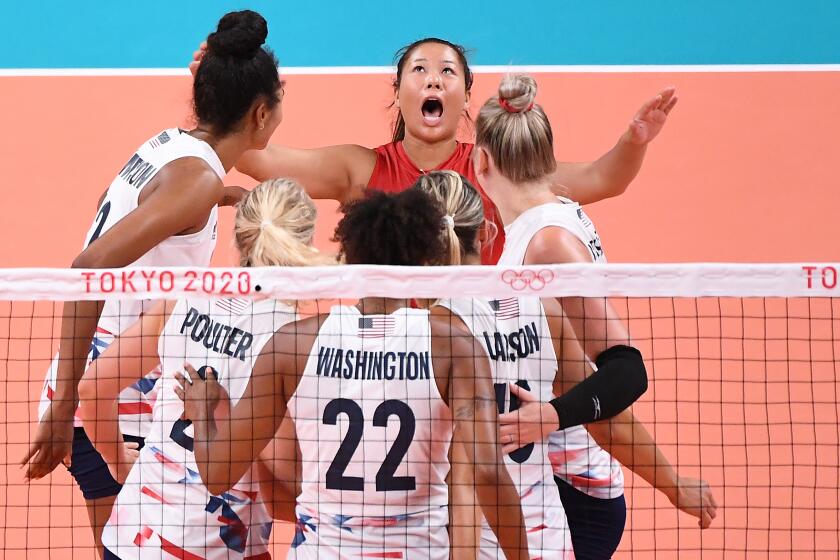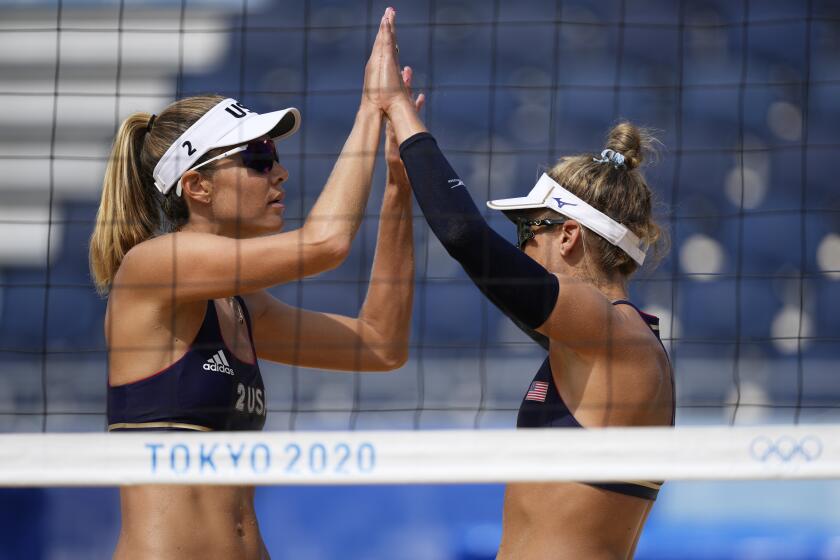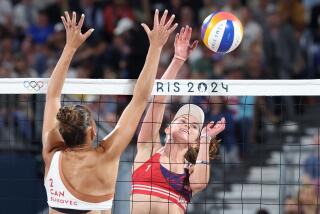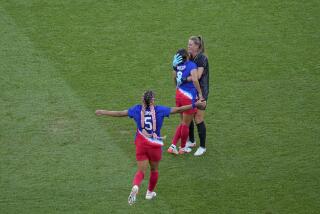U.S. women’s volleyball ‘standing on the shoulders’ of legendary 1980 squad
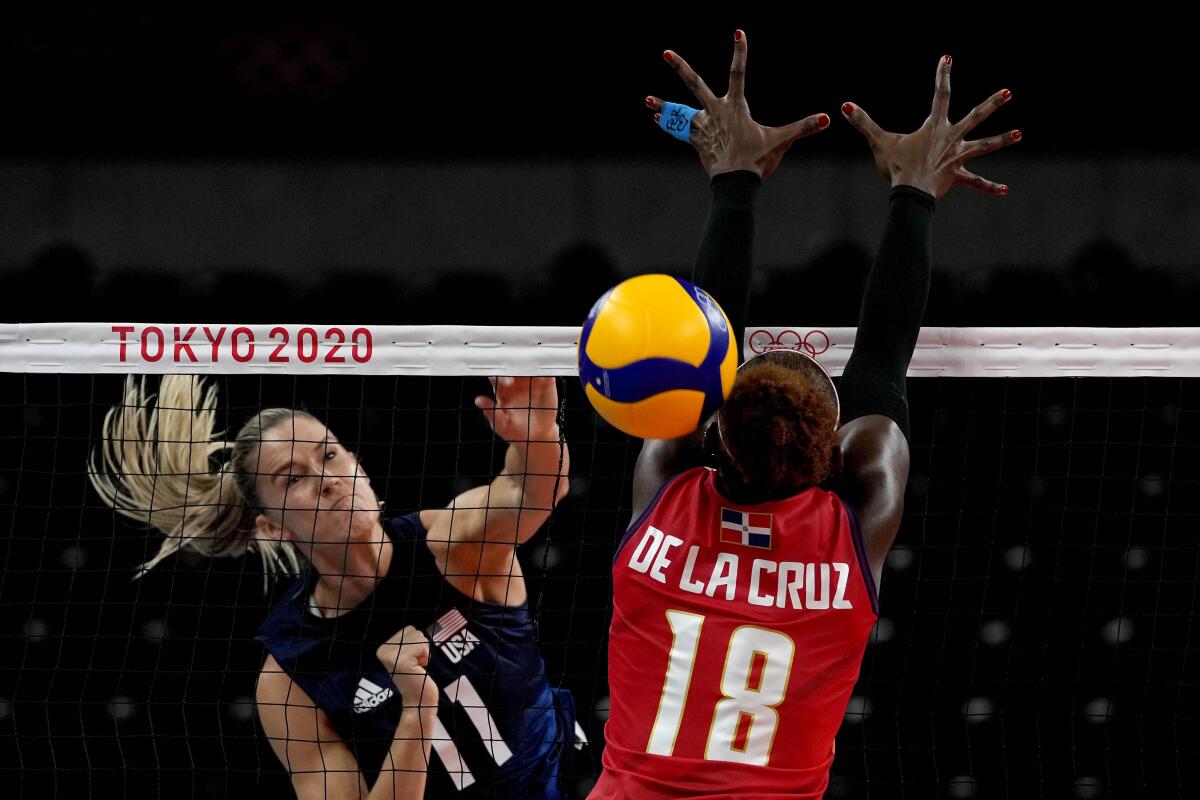
- Share via
TOKYO — The United States women’s volleyball team arrived here stocked with gifts from a special group of forebears.
There were personally inscribed bookmarks, journals to preserve precious memories and Japanese lanterns that have adorned players’ suites inside the Olympic village, all reminders of the team that made this run at history possible.
“I’m getting goosebumps thinking about it,” coach Karch Kiraly said Wednesday inside Ariake Arena after his team advanced to a semifinal in these Tokyo Olympics with a 25-11, 25-20, 25-19 quarterfinal victory over the Dominican Republic.
Justine Wong-Orantes never gave up on her dream of playing Olympic volleyball. Competing for gold in Tokyo, she’s making the most of her chance.
Like the current team, the 1980 Americans were considered among the world’s best. They reached that status only after making a change in approach that would benefit all men’s and women’s teams to follow, helping the men win three gold medals and establishing the women as regular contenders after having finished no better than eighth in their first five Olympic appearances.
The 1980 U.S. women’s team was the first to commence year-round training, in 1977, after previous teams had been assembled only several weeks before the Olympics in a hasty attempt at world dominance. It fell flat. The men’s and women’s teams did not qualify for the 1972 or ’76 Olympics, and the men did not qualify in ’80.
The women qualified that year and were set to make a run at a gold medal before the politically motivated U.S. boycott of the Summer Games ended those dreams. Some returned to compete in the Los Angeles Olympics four years later while others did not.
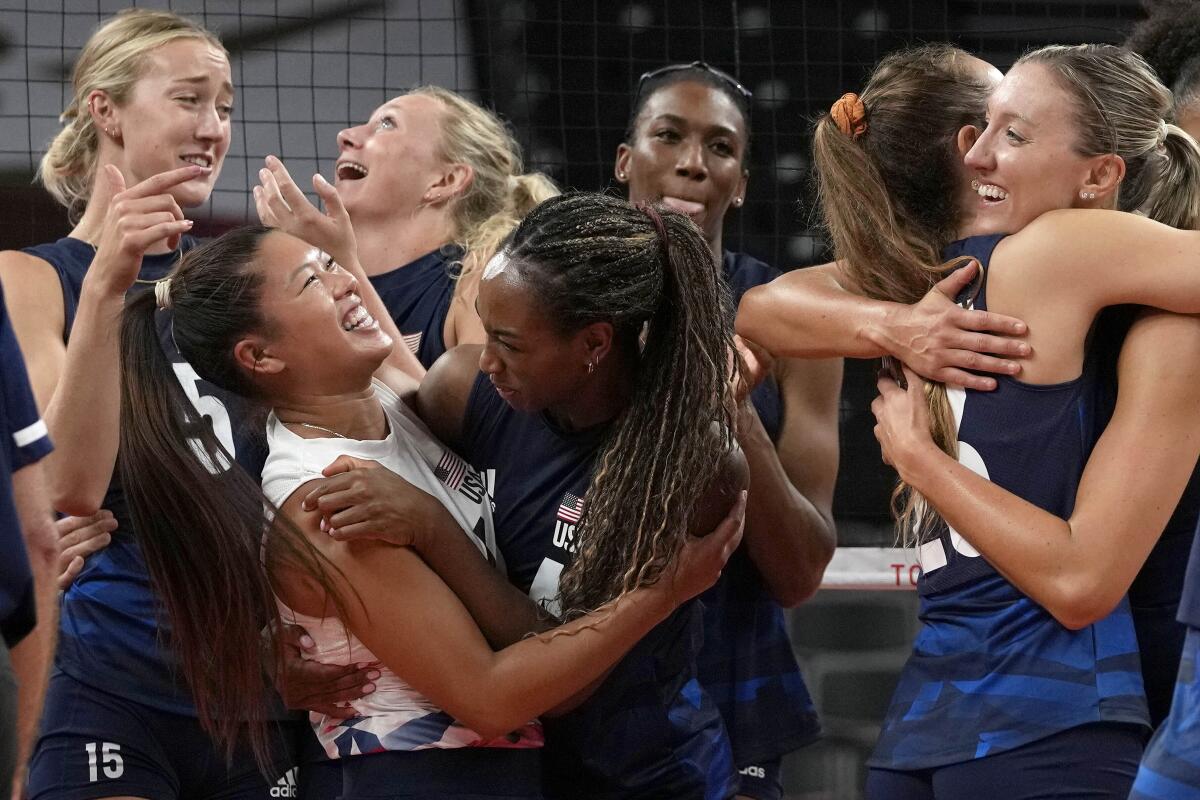
As nine members of the 1980 team gathered last week at a mountain lodge in Lake George, Colo., for a 40-year reunion that got pushed back a year by the pandemic, they gathered around a big-screen television to cheer for their new heroes.
The alumni had already sent all those gifts to every member of the U.S. delegation — including players, staff and coaches — before their departure for Japan. They also delivered video messages of encouragement as well as footage of them watching games together early in the tournament.
The current players returned the favor with their own pictures and messages, understanding that winning the Americans’ first gold medal in the sport would not just be for themselves.
“It was really, really sweet and heartfelt,” Kiraly said of the gestures from the former players, “and so our team feels a really special bond with them and the support they’re sending.”
Being partners in beach volleyball means you’re probably going to go through a breakup. The sport’s up-and-down nature leads to a lot of turnover.
Kiraly was part of the first U.S. men’s team to win Olympic gold, in 1984, after having followed the women’s approach of training all year. The Americans would go on to win additional gold medals in 1988 and 2008.
The women are still seeking a breakthrough. In their previous 11 Olympic appearances, they have won three silver medals and two bronze. Their next match comes against Serbia in a semifinal on Friday after they dominated the Dominicans.
“We haven’t stood at the top of the podium yet,” Kiraly said, “so our goal, our objective, is always to try to do something that’s never been done before.”
Setter Jordyn Poulter and opposite hitter Jordan Thompson were available to play for the Americans on Wednesday after having suffered ankle injuries earlier in the tournament but were not needed given the lopsided nature of the match.
The U.S. established early control with a strong service game, continually putting the Dominicans’ best setters in scramble mode and unable to set up their top hitters. By the time the Dominicans found some lineup combinations to better counter the Americans’ attack, they were in too deep of a hole.
“We just came out with a fearless mindset and we just knew from the get-go we were ready,” said libero Justine Wong-Orantes, a former Los Alamitos High star. “Our service pressure helped with that, to relieve some of that off of our blocking defense, so we just had a game plan and we executed it really well.”
The mountain retreat for the 1980 team has ended, reunions only lasting so long, everyone dispersing to various parts of the country. Kiraly said the support his team feels from its predecessors transcends the cheers directed at a television screen.
“They showed us how, they showed us the way,” Kiraly said, “and so it’s awesome that we stand on their shoulders.”
More to Read
Go beyond the scoreboard
Get the latest on L.A.'s teams in the daily Sports Report newsletter.
You may occasionally receive promotional content from the Los Angeles Times.

